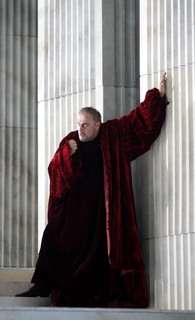|
Back
Viva Simon! Madrid
Teatro Real
07/17/2010 - & July 20*, 22, 23, 25, 26, 28, 29
Giuseppe Verdi: Simon Boccanegra
George Gagnidze*/Plácido Domingo (Simon Boccanegra), Inva Mula*/Angela Gheorghiu (Amelia Grimaldi), Giacomo Prestia*/Ferruccio Furlanetto (Jacopo Fiesco), Fabio Sartori*/Marcello Giordani (Gabriele Adorno), Angel Ódena/Simone Piazzola* (Paolo Albiani), Miguel Angel Zapater (Pietro), Kostantyn Andreiev (A captain of the crossbow men), Beatriz de Gálvez (Amelia’s maid)
Chorus of the Teatro Real, Peter Burian (chorus director), Orchestra of the Teatro Real, Jesús López Cobos (conductor)
Giancarlo del Monaco (production), Wolfgang von Zoubek (lighting) 
G. Gagnidze (© Javier del Real)
Simon Boccanegra premiered unsuccessfully in Venice in 1857 with a libretto by Francesco Maria Piave. Verdi later revised the opera in 1881 with a new libretto by Arrigo Boito, transforming it into a masterpiece of profound emotional impact, due in large part to Boccanegra’s more complex character development, and the greater depth of characterization of the villain Paolo. The Council Chamber scene, one of the dramatic high-points of the opera in which the majesty, power, and humanity of Boccanegra’s public face is established, was also added in this revision. After the success of the revised Boccanegra, Verdi went on to collaborate with Boito on his last two operas, Otello and Falstaff.
With its assumed identities, reversals of fortune, and personal and political machinations, the plot of Boccanegra is admittedly somewhat complex. But Simon’s overwhelming desire for reconciling the warring factions he encounters in his personal and public life rises above it all. His desire for personal forgiveness and political unity is so strong, he repeatedly offers to sacrifice his life if this will heal the breach. In the final scene, his self-proclaimed martyrdom paves the way for a future of peace for Genoa, and happiness for his restored family. Such themes are threaded through much of Verdi’s work, reflecting his own belief in Italian Risorgimento, and the personal pain of the early loss of his family. Despite these grand themes, Boccanegra remains a simple man at heart, a former pirate, risen to great power only in hope of being found worthy of his now lost love. The sea is never far from his thoughts, and its rolling sound runs through the musical score, performed thrillingly here under the direction of Jesús López Cobos.
The sea formed a key visual element of Giancarlo del Monaco’s spare but sumptuous production, with a projection of a gentle deep blue sea forming the backdrop of the first act against which Amelia sings of her love for Gabriele Adorno. As the plotting of Paolo becomes deadly, the projected sea darkens and roils with storm. All the scenes were played out in a classical white marble space, with steps, statues, tables and an imposing throne alternating to provide just the necessary set elements. The costumes contributed an additional painterly element, being rendered in shades of black, grey and rich red, with elegant drapery and plush velvet for the Doge.
In only the second performance of his role debut as the Doge Boccanegra, George Gagnidze turned in a stunning performance. The role seems to lie perfectly for his voice, which met all the demands of this challenging role from its deepest sonorities to haunting mezza voce and soaring pianissimi with clear natural production and superb legato throughout. Boccanegra is by turns a young lover, a doting father, a strong-willed ruler and finally, an almost Christ-like disciple of love and forgiveness. Gagnidze rises to all the challenges dramatically and vocally. His Simon was regal and powerful, while always remaining eminently human. With his dark rich timbre, seemingly effortless lyricism, full command of dynamic nuance, and fine dramatic skills, Gagnidze was a profoundly moving and beautiful Boccanegra.
Giacomo Prestia gave a magnificent performance as Fiesco. He sang with both power and elegance, displaying a range of colors rarely found in true basses. He is also a splendid actor. His scenes with Gagnidze were among the most effective, especially in the final reconciliation and Simon’s extraordinarily moving death scene. This scene included one of the most striking tableaux, with Fiesco cradling the dying Boccanegra in a pose poignantly reminiscent of Michelangelo’s Florentine Pietà.
The impressive depth of casting encompassed the other major male role in this male-dominated opera. Fabio Sartori as Gabriele Adorno vocally portrayed Adorno’s passion and conflict. His dark burnished tone, easy production, large voice, and innate musicality were reminiscent of the early Domingo. Sartori’s “Perdon, Amelia” in the second act was ravishingly sung. Simone Piazzola in his house debut as the villain Paolo, had a strong vibrant tone, and convincingly portrayed the arc of his character from political plotter, to tormented traitor and murderer. As the only major female character, Amelia, Inva Mula, also in a role debut, provided the necessary leavening for the darker voices with her luminous soprano. She fully captured the slow realization and sudden joy of the recognition scene with Boccanegra, mirroring his profound tenderness with a sweetness of her own.
A brilliant performance by the chorus supported these outstanding soloists. As in so much of Verdi, the chorus here provides much of the mood of the public aspect of the opera, and is a key component both vocally and in terms of plot development. Among the many thrilling choral scenes, the chorus truly excelled in the council chamber, moving from riot and dissent to celebration of peace and love to their truly chilling sotto voce echo of the curse Paolo is forced to call down upon himself. Their contribution rounded out a truly powerful and moving evening in the theater.
Arlene Judith Klotzko
|